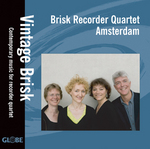 Globe Records just released the cd ‘Vintage Brisk: a selection of the new music the ensemble commissioned from Dutch composers in the past 20 years, including two pieces of mine…
Globe Records just released the cd ‘Vintage Brisk: a selection of the new music the ensemble commissioned from Dutch composers in the past 20 years, including two pieces of mine…
This cd is a fruit of 20 years of Brisk’s creative programming and commissioning, featuring 15 works written especially for Brisk: eight older pieces and a brand new one written especially for the jubilee year (de Graaff’s Brisk Frog Project), together with six smaller ones written as exclusive birthday presents for the ensemble by some of the composers on the cd. The ensemble is assisted by pianist Tomoko Mukayama and the Egidius Quartet as well as by tape and electronics (which today is much less remarkable for a recorder quartet).
From its inception, Brisk has specialized in mixing the contemporary with the historical, with the best of such programmes making the two mutually illuminating. This novel cd by Brisk seems to lack the illuminating historical element, by concentrating on newly composed music . However, this is generously made up for by the fact that most of the featured composers include historical elements.
I very much like this trend in contemporary composition: the very conscious use and adaptation of historical and contemporary, often non-classical styles.
This is somewhat comparable to the (neo)classicism in the Interbellum period. But today, the stylistic spectrum is wider, it lacks caricature and distancing effects, and compared to many latterday postmodernisms it seems to completely lack the sense of alienation that results from quotation (or ‘quotation’).
To the contrary, in their different ways, most composers on this cd show direct, loving and heartfelt inclinations towards medieval and renaissance music, non-western folk musics, different types of jazz and funk, and even (way outside the historical scope of the recorder) towards French late-romanticism.
There is, inevitably, many a trace of post-minimalism, especially of the ‘The Hague School’-variety: Ford, Huba de Graaf and certainly Mensingh show the typical, at times skillful, rhythmic re-arrangement of a limited set of elements. Tsoupaki and Janssen also show a tendency towards artful simplicity, though not of minimalistic origin, but rooted in their preference for Greek folk music and jazz, respectively. Like his teacher Manneke, Bart Visman tends towards what one would call a ‘French’ sound, But whereas Manneke explores the modernistic directions of that idiom, Visman shows it has exotic and low-brow tendencies and he combines these in a particularly virtuoso manner, with a rhythmic freshness and brio that would befit Britten.
I like this CD. As a composer and a listener, I have often felt that, well, too much of undiluted flauti dolce makes for a one-sided taste. But this cd shows (for listeners and composers alike) that the recorder’s qualities are enhanced in combination with voices, electronics, and other instruments (including its arch enemy, the grand piano), provided that a sensible and clearly tangible link is retained with its original historical repertoire.
The pieces that I myself contributed are the Quartet (part 3-4) and Catch (an Angel).